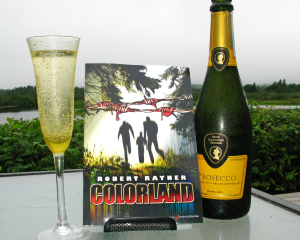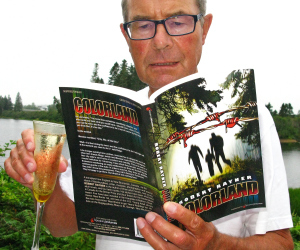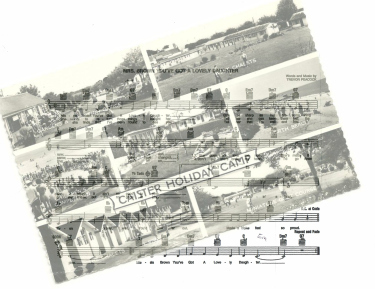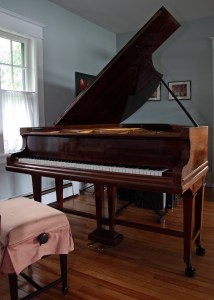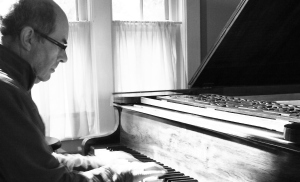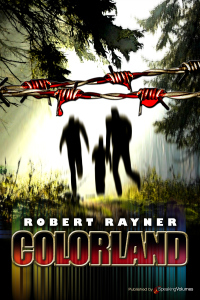Robert Rayner's Blog, page 5
September 10, 2015
Stories from a Lost Summer (1) Or, ‘Where do fictional characters come from?’
Glen was a waitress and a drifter, maybe in her thirties. Gawky build and red hair. She looked like Ginger in West Side Story. I met her at a holiday camp where I was working while I marked time between leaving high school and getting a real job. She was friends – maybe more than a friend, I wasn’t sure – with Al, a cook at the camp who befriended me, and through him she became another of my casual, passing friends. The three of us spent time together between shifts, talking, walking on the beach, helping one another fend off the strangeness and insecurity and ever lurking loneliness of a temporary environment. She’d taken to working a never ending succession of casual jobs as a reaction against the dominating over-possessiveness of her parents, who would now have nothing to do with her because of her way of life. She’d been a prostitute in London, an unsuccessful hairdresser in Nottingham before that, now plied the former trade at the holiday camp in between waitressing, which seemed to be common knowledge among the staff although Al refused to believe it. She often complained of being cold and he gallantly loaned her his sweaters, which she usually didn’t return. One night in the beach café we talked, amongst other things, about our homes, and I asked her whether she wouldn’t prefer a home and family to makeshift homes and passing friends. She looked out of the window at the sea and started to cry. She was fired soon after for stealing from her fellow workers in the restaurant. Never said goodbye to Al. He said he was glad she’d returned at least one of his sweaters, said he could smell her on it, slept with it on his pillow. She left him a note, Please don’t think too badly of me, honey.


August 28, 2015
Around the World with Colorland!
Yeah, I know I’m naïve in this techno world, but this still blows me away …
Just supposin’ you wanted to buy a print copy of Colorland and went on Amazon. In Canada you’d get it for $19.72, whereas in the U.S. it’d be $14.95 (ouch). You could pick it up for 9.60 British pounds in the U.K. and it’d be a trifling 14.24 Euros in France but it’d set you back 14.45 Euros just up the road in Germany. In India you’d find it for (look out) 1,124.00 Rupees, impressing me with how highly good literature is valued there until I realised that’s about $22.50 Canadian. And if you found yourself in Brazil and went looking a good read, Colorland is available only (so far) in Kindle form for a mere 15.64 Brazilian Real.
And if you’re living near li’l’ old St. George, New Brunswick – I still have a few copies left at a bargain price.


August 22, 2015
Here at Last
Toasting the release of Colorland in print form. It’s already available as an ebook from Indigo, Barnes & Noble, Amazon, iTunes, etc., but in print form it just feels that much more … real.
The crossover novel is a new departure for me, a thriller (I hope) with a touch of fantasy that from the portentous opening words, Isolde is crying again, launches you into a whirlwind of Adventure! Rebellion! Romance! Heartbreak!
Just received my advance copies, from which I may have a few to spare that you can get (if you live around St. George) for a special come-and-get-me-quick tax free price. I have more coming and suspect I’ll be starting a waiting list. Copies will also be appearing in stores soon.


August 14, 2015
Dedication (Unspoken)
The band sometimes does the sweet pop lament, Mrs. Brown You’ve Got a Lovely Daughter, and I sing, putting on an exaggerated English accent. The song was written by English character actor Trevor Peacock for Joe Brown and the Bruvvers, although never recorded by them. Actor Tom Courtenay sung it in a TV play called The Lads before Herman’s Hermits did their trivialised hit version.
I don’t like lengthy introductions to songs, which tend to be self-indulgent, or pretentious, or self-glorifying, or all three, so all I say, if anything, when I sing it is something like, ‘Here’s one of the saddest songs in the world’, then I get on with it.
But I always have much more in mind, a kind of unspoken introduction (yes, self-indulgent, pretentious, self-glorifying), which is …
As a green sixteen year old, dithering uselessly in the time between leaving high school (prematurely) and getting a real job (if you can call journalism, then teaching, finally principal-ing, real jobs), one of the places I worked was an English holiday camp, a bizarre form of holidaymaking, unique to England, I think, which offered organised activities (bingo, prettiest grandma, knobbly knees, cards) through the day for vacationing families, who stayed on site in little cabins.
As you can imagine, I encountered a variety of characters who worked there, some on the sketchy side, including a man on the run from the law who cornered me and threatened me one night because he thought I knew who he was and I was about to shop him. I also met some memorable characters who became passing friends, including the musicians who formed the camp band and played during afternoon tea and for the nightly dance, and who, when the dance was over, kept playing, with just the staff staying on. I joined them a few times, playing the piano embarrassingly inadequately, but they were kind. Vince was the drummer. Like all the camp workers, he called me Caesar, because at that time I wore my hair (hair!) in a Caesar fringe. Vince was at least partly responsible for my moving from go-nowhere jobs to journalism, and subsequently to teaching, when towards the end of the season I received a letter offering me a job as a trainee reporter. By that time, with no other prospects, I’d decided to move on to another casual job with some of the staff. I told Vince about the letter, and that maybe I wouldn’t follow it up, thinking he’d approve. (He had another drumming job lined up, he thought, but they never lasted long.) He poked me in the chest and said, “Don’t be daft. Take the job.” Which I did.
A short exchange with a casual friend. And a profound effect on my life.
I’ve heard nothing of or from Vince, or any of those fleeting friends, since then, except a year into my work on the paper I read that he was playing with … Joe Brown and the Bruvvers. So every time I sing Mrs. Brown You’ve Got a Lovely Daughter, I think – I don’t know where you are or what you’re doing, Vince, but this is for you.


July 31, 2015
More Bechstein Blues
A last lament for the sadly departed Bechstein, recorded before it fell into serious decline. This is Miss Celie’s Blues, by Quincy Jones and Rod Temperton, arranged by Dan Coates.


July 23, 2015
Bechstein Blues
It was time.
It was as simple as that. Sad but inevitable.
The old Bechstein Grand Piano (Model V, 6 ft. 8 ins., Berlin 1899) had to go.
It was showing its age, not in an outward way – it looked as impressive as ever, still capable of drawing gasps of admiration from unsuspecting visitors walking in on it – but its workings, most significantly, its ability to stay in tune, were failing, and it was becoming increasingly non-functional, like a chair so uncomfortable you don’t want to sit on it, or a table that’s liable to collapse if you lean on it, and the piano tuner’s prognosis was that it would continue its decline without extensive repairs at a price we couldn’t afford.
So it went on Kijiji, the decision to sell like the decision to take a loved dog to the vet to bring an end to its life, necessary and unavoidable, perhaps, but still a crass betrayal for its years of giving and companionship and comfort. After over a year, and numerous enquiries, and several visits from prospective buyers, the piano was sold, and left us on a fittingly dark and stormy night, in ceaseless, torrential rain, and moved into an interesting new life, destined for a bit part in a movie, which at least partly mollified the sadness of its going.
Of course we sold not just the piano, but also my memories of growing up with it, of seeing it in the drawing room of my great aunt’s house in England, the piano’s original home, a room that seems to me in retrospect to have been a kind of Victorian holdover, dark, with heavy drapes and chunky furniture; of piano lessons on Saturday morning, ten years old, then home to practice – on a grand piano!; of missing the piano so much when it was sent to London for overhaul and maintenance that I sat with music book on my lap, air playing, so preceding the mercifully brief fad of air guitar by a good number of years, except that the histrionic movement associated with air guitar is difficult to pull off with air piano when you’re burdened with a tome of Beethoven sonatas.
The problem is, what do you replace a magnificent grand piano with, an instrument that has been in the family for three generations, and that has provided music in at least two countries on two continents?
Well you shrug off your proud Ludditism and your purist leanings and enter the 21st century and go digital and promptly and heartlessly buy a Roland DP90Se.
And confirm what you knew already, that the digital sound is reasonably authentic. If you were to listen from another room, I think you’d be hard put to distinguish the Roland from an acoustic piano. Moreover, the Roland is flexible, capable of playing a Concert Grand sound (its default setting), as well as several other Grand sounds (Ballade, Bright, Fortepiano …), some on the cheesy side (Magical) but you don’t have to play them if you don’t want to and they can be fun used in strict moderation, and a variety of Upright sounds (Rock, Ragtime …) and hundreds of instrumental sounds most of which will probably never get used.
Maybe the touch isn’t quite the same, but that’s okay, and the whole experience of playing it is different (for a start I’ve never had to keep an operating manual beside me when I was playing the piano), and that’s okay, too, when you get used to it. With the Bechstein you play with more than six feet of formidably elegant instrument in front of you, and you feel its bulk and solidity under your fingers and in the sound, and you never quite feel you’re doing it justice unless you play with spectacular ability (which I don’t), and don some kind of formal dress, the default attire of jeans and t shirt adding insult to modest performance.
And while the Roland is not an instrument whose stature dominates a room, like the Bechstein – it’s not even the size of a console upright acoustic piano – it’s not unattractive, with its sleek shiny casing and its clean lines, and its sound rivals an acoustic piano, even a grand, in quality, and with the boost of an amplifier can disturb an even wider area of the neighbourhood than a traditional piano.
Here’s a lament for the departed Bechstein, Pachelbel’s famous Canon in D, played on the Roland DP90Se with the Pipe Organ setting.


July 2, 2015
Island Rhapsody (Revisited)
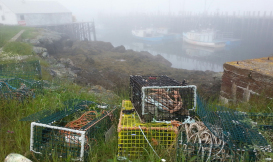
I hesitate to rhapsodise (again) about White Head Island, for fear of flooding it with tourists, but I think the barriers of distance (it’s in darkest Atlantic Canada) and inconvenient travel (two ferries) and hardly anywhere to stay once you get there, plus the fact that only a dozen or so people read this blog, anyway, make it safe to do so.
So here are a few alluring pictures …
Returning home via Grand Manan Island, strolling on the North Head wharf while waiting for the ferry, we noticed a fishing boat named Second Wind, the title I used for one of my stories, set on a fictionalised … Grand Manan and White Head Island.

If the captain reads this, and gives me a call, I’d be happy to supply a copy!


June 12, 2015
Adventure! Rebellion! Romance! Heartbreak!
The first line of Colorland:
Isolde is crying again.
The last lines:
Wenden stopped and held his hand out to her. “Come on, Is.”
She was crying again.
In between: Adventure! Rebellion! Romance! Heartbreak!
On sale any day now …




